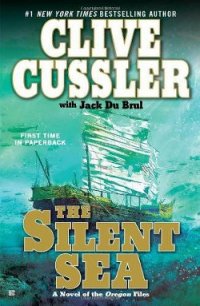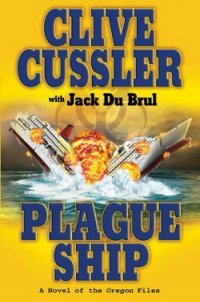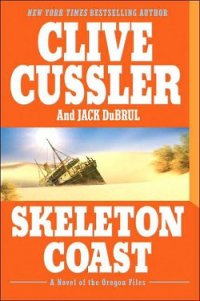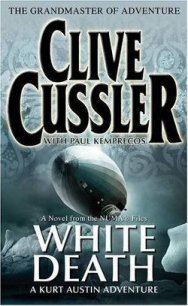Dark Watch - Cussler Clive (книга бесплатный формат .txt) 📗
“Neither.” Mark handed over a thin file. Inside was a single photograph and a half-page description.
Juan glanced at the picture and gave Murphy a questioning look. “You sure?”
“She’s on her way to Taiwan from Oratu, Japan, where she was used for a refit of a Panamanian tanker that threw a prop during a storm.”
Juan looked at the picture again. The vessel was 800 feet long and 240 feet wide. Just as Tory had described, the ship was completely rectangular, with no rake to her bow or stern and nothing protruding from her deck to alter her flat profile. Juan read what Mark had managed to learn about the odd craft. She was the fourth-largest floating drydock in the world. Built in Russia to service massive Oscar II–class submarines like the ill-fated Kursk, it had been sold to a German salvage firm a year ago but had then been sold again to an Indonesian shipping company who chartered it out like a service station wrecker.
Juan’s pulse quickened.
Using a drydock to hijack an entire ship at sea was truly inspired but also frightening in scope and sophistication. His deep fear about a leader uniting pirates across the Pacific into a coherent group might well be the tip of the iceberg. With a drydock this size, they could snatch nearly any ship they wanted.
He pictured how they’d pull it off. First a team of pirates would need to board their intended target in order to subdue the crew. Then they would sail their captured ship to rendezvous with the drydock. Under the cover of night, and only when weather conditions were favorable, because it would be dicey work, the drydock would ballast down so the bottom of its open hold was lower than the keel of their stolen ship. Big winches at the stern of the drydock would then reel in the vessel. The bow doors would swing closed, ballast pumped out, and the tugs towing the drydock would continue on their way. Without a direct overflight, no one would ever know that inside the drydock was the booty of the most audacious pirate ring in history.
“Pretty slick, hey boss?”
“Yeah.”
“They come along and swallow up their victim.” Mark gave an animated pantomime of the action as he spoke. “Haul it to their secret base. They’d have all the time in the world to offload the cargo before dismantling it. Rather than scavenge like hyenas, these guys are taking down their prey like lions.”
“Why dismantle the ship?” Cabrillo mused aloud. “Why not make some changes to it, alter a few characteristics, paint a new name on her stern, and either sell her off or sail her for themselves?”
“I hadn’t thought of that, but that makes even more sense.”
“So what do we know about the company that owns the drydock? Wait, what’s it called?”
“The drydock?” Murphy asked and Cabrillo nodded. “Maus.”
“German for mouse. Cute. So, the company?”
“Occident and Orient Lines. O&O. They’ve been around for like a hundred years. Used to be publicly traded, but in the past decade most of the shares have been bought up by entity or entities unknown.”
“Shell companies?”
“So hollow even their names ring false. D Commercial Advisors LLC. Ajax Trading LLC. Equity Partners International LLC. Financial Assay —”
“LLC,” Juan finished for him. Then a thought struck. “Wait. Assay is a mining term. Julia said the pirates were dying of mercury poisoning, and we both think they might be based near an abandoned mercury mine. I wonder if this Financial Assay owns mines in the region.”
“I haven’t even started digging into the shell companies yet. I thought you’d want to know about the drydock right away.”
“No, you’re right, but you’ve got a lot more to research. I want to know who owns the Maus — not the corporate veil but the actual guy who holds the pink slip.”
“What are we going to do about the drydock? If what that British woman said is true, there might be a stolen ship in her hold and maybe some crew held hostage.”
“The most powerful tugs in the world can’t tow a vessel the size of Maus at more than six or seven knots. How long do you think their head start’s gonna last when we’re pushing fifty?”
Murph grinned like a teenager given the keys to a Ferrari. He got up to leave.
Juan came to a quick decision. He knew at some point he was going to have to split his forces. The Oregon was a perfect platform for espionage operations, but he needed the flexibility of people on the ground with access to jet travel. He had no idea where this case was going to take him. Most likely Indonesia, if that was where O&O still kept an office, so now was the time to get assets en route.
“Do me a favor and find Eddie Seng. Tell him to pack up some gear. We’ll be going international, so nothing that can’t pass airport security. Have him pick two of his men. We’re hitching a ride on Tory Ballinger’s helicopter to go hunting hyenas and lions.”
“But where?”
Juan tapped Mark’s report. “Have an answer by the time we land in Japan.”
9
ANTON Savich would have preferred meeting Shere Singh at his office in a downtown Jakarta high-rise, but the stubborn Sikh demanded they meet at the site of Singh’s latest venture, across the Sunda Strait on Sumatra. Savich had developed a healthy fear of flying after crisscrossing the Soviet Union for years on Aeroflot and would have taken a ferry despite Indonesia’s dismal maritime safety record but was saved when Singh offered him use of his company helicopter.
He looked out the yellowed Plexiglas at the strip of beach below the chopper that seemed to guard the jungle from the sea. It was a primeval landscape, and the villages that flashed under him looked as though they hadn’t changed in generations. The wooden fishing boats clustered in secluded bays had likely been built by the grandfathers of the men who sailed them today. The land to his left was hidden by an impenetrable canopy of vegetation that had yet to fall to slash-and-burn farming or industrial timber cutting. To his right, the sea was clear blue and pristine. A double-masted schooner, a coastal freighter he assumed, cut through the light swells with her sails bellied taut by the trade winds. She looked as though she’d sailed out of the nineteenth century.
How could a people who had known such a paradise as the archipelago create a city like Jakarta with its eighteen million people, gridlocked traffic, crime, poverty, disease, and smog as thick and noxious as a World War One mustard gas attack? In their rush to modernize, the Indonesians had embraced the worst of what the West had to offer and then abandoned the best of their own culture. They’d created a patchwork of consumerism, corruption, and burgeoning religious fanaticism that teetered on the brink of collapse. Through contacts, Savich had learned that the United States had clandestinely stationed more than a thousand soldiers on the islands to help train local forces to fight the twenty-first century war.
The pilot tapped Savich’s arm and pointed ahead. He grudgingly looked away from the peaceful sailing ship and focused his attention on their destination. The complex was hidden in a bay by a rocky promontory, so all he could see was the flotilla of ships lying at anchor. Even from this distance and altitude he could tell they were derelicts, the steel husks of once-proud vessels that had outlived their usefulness. Several were wreathed in shimmering halos of their own spilled bunker fuel, like murdered corpses surrounded by their own blood and waste. One had lain so long here that her keel had succumbed to corrosion. Her bow and stern both pointed skyward with her crushed stack vised in between like a nut in a giant cracker. A quarter way to the horizon a line of oil containment boom cut a wide arc around the bay. There was an entrance gate manned by a pair of small tenders that could open the floating boom to allow the ship’s entrance. No ships ever left the facility, at least by sea.




